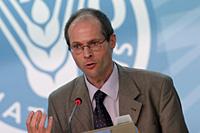U.N. Special Rapporteur on Right to Food Brings Global Experiences to the Law School
UN Special Rapporteur on Right to Food Brings Global Experiences to the Law School
Media Contact: Public Affairs Office, 212-854-2650 [email protected]
New York, Aug. 15, 2011—As the son of a diplomat, Olivier De Schutter spent his boyhood in places such as India, Rwanda and Saudi Arabia, where he saw the daily struggles many residents endured just to survive.
These days, De Schutter (below) still spends time witnessing the challenges the world’s poorest citizens face in trying to feed themselves and their families. Only now, he’s doing it as the United Nations Special Rapporteur on the right to food, a post he has held since 2008.
“When you’re 10, 12 years old, you are very very impressed by certain things, particularly the contrast between the luxury in which you live and the extreme poverty surrounding you,” said De Schutter, the James S. Carpentier Visiting Professor of Law at Columbia Law School. “Today, when I particularly travel in south Asia, India, where I lived, or certain parts of Africa, I do feel that I’m sort of trying to compensate for this guilt that I developed as an adolescent living in these countries unable to change anything and basically never being subjected to the same kind of suffering that the people around me were subjected to.”
“It’s been extremely important in the shaping of my understanding of the world surrounding me,” the human rights expert said, “and it makes me want to contribute my small bits to make things equal.”
One of those bits will be teaching a course at the Law School next month titled The Legal and Political Economy of Hunger. De Schutter plans to integrate his experiences as special rapporteur into his seminars, giving students a first-hand perspective on the issues that have resulted in nearly 1 billion hungry people in the world.
Most people see hunger as a technical issue, perceiving the problem as too little food for too much demand, said De Schutter, who also is Professor of Human Rights at the University of Louvain, Belgium, and at the College of Europe, Natolin.
“In fact, hunger is deeply political,” he said. “It is linked to bad governance, unaccountable institutions, a lack of empowerment of the poorest segment of the population in many countries, and basically a lack of interest by governments into the fates of particularly the poor populations in rural areas, which is where hunger essentially still resides today.”
Such obstacles are frequently on display when De Schutter embarks on missions to various countries to assess their performance in combating hunger. He goes at the invitation of the host nation,and his latest trip was to Madagascar, an island nation off the coast of Africa where about 76 percent of its population lives in poverty.
De Schutter determined that sanctions imposed by the international community following a 2009 coup d’etat were hurting the poorest residents of Madagascar. But he also observed how small farmers were able to link into global supply chains to sell their products with the help of large, multinational corporations.
“These are things I could witness firsthand and I intend to discuss in my seminar the issue of how agribusiness can contribute to improving the incomes of the poorest food producers,” he said.
Earlier in the year, De Schutter visited South Africa and Mexico and in 2010 conducted missions to Syria and China. In 2009, he went to Guatemala, Brazil, Benin and Nicaragua. Almost everywhere he’s been, the impact of climate change—another topic in his Law School course—has been at the forefront.
“All the small farmers in the developing world speak about rainfalls becoming completely unpredictable, they speak about droughts and floods that are increasingly frequent and extreme, and they speak about the difficulty they have in maintaining the existing levels of productivity as a result,” De Schutter said.
But the factors that contribute to the world’s poorest people going hungry are not unalterable.
“What I would like the students to understand,” De Schutter said, “is that things can be changed, and they can be changed by increasing accountability, transparency, and by empowering farmers organizations and civil society organizations.”
As a law professor and author of the groundbreaking textbook, International Human Rights Law, De Schutter has proven again and again he can convey to students how human rights law is used as a tool to address complex contemporary issues such as global hunger and poverty.
This new course will be no different, with De Schutter explaining why the law is important and how a lawyer’s approach, based on the right to food and improving governance, is the key to long-term solutions.
Written by Greg Saitz
# # #
Columbia Law School, founded in 1858, stands at the forefront of legal education and of the law in a global society. Columbia Law School joins its traditional strengths in international and comparative law, constitutional law, administrative law, business law and human rights law with pioneering work in the areas of intellectual property, digital technology, sexuality and gender, criminal, national security, and environmental law.
Visit us: http://www.law.columbia.edu/
Follow us on Twitter http://www.twitter.com/columbialaw
Follow us on Twitter http://www.twitter.com/columbialaw
